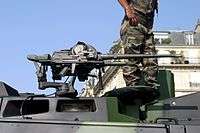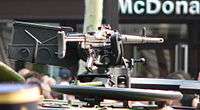AA-52 machine gun
| AA-52 | |
|---|---|
|
AA-52 mounted on a Leclerc main battle tank | |
| Type | General-purpose machine gun |
| Place of origin |
|
| Service history | |
| In service | 1952–present |
| Used by | See Users |
| Wars |
First Indochina War Algerian war Suez Crisis Gulf War Bosnian War War in Afghanistan 2011 Libyan uprising[1] Operation Serval |
| Production history | |
| Designed | 1952 |
| Manufacturer | Manufacture d'armes de Saint-Étienne (MAS) |
| Variants |
NF-1 M.A.C. 58 |
| Specifications | |
| Weight | 9.970 kg |
| Length | 1080 mm |
| Barrel length | 600 mm |
|
| |
| Cartridge |
7.5×54mm French 7.62×51mm NATO |
| Calibre |
7.5 mm 7.62 mm |
| Action | Lever-delayed blowback |
| Rate of fire | 900 round/min |
| Muzzle velocity | 830 m/s |
| Effective firing range | 600 metres |
| Maximum firing range | 3,200 metres |
| Feed system | Belt |
| Sights |
Iron Removable APX (SOM) telescopic sights IR scope |
The AA-52 (full designation in French: Arme Automatique Transformable Modèle 1952, "Transformable automatic weapon model 1952"), also known as "La Nana", is one of the first French-produced guns of the post–World War II era. It was manufactured by the French government-owned Manufacture d'armes de Saint-Étienne (MAS) company. The AA-52 is still used today as a vehicle-mounted weapon due to large quantities in service, but has been replaced in the helicopter role by the Belgian FN MAG, starting with the EC 725 Caracal of the special operations units and the Air Force search and rescue teams. The AA-52 had been largely phased out for infantry use in favour of the lighter FN Minimi. The AA-52 is still in use in Afghanistan.
History
The AA-52 machine gun was conceived and developed following the French military's experiences in the First Indochina War during the early 1950s. At that time, the French army was equipped with an assortment of weapons from British and American sources, as well as some German weapons from the Second World War.
Effective supply of ammunition and replacement parts was an almost insoluble task and the army decided to adopt a standard machine gun. The result was the AA-52, conceived for ease of production. The construction is of simple welded stamped sheet steel.
Overview
The AA-52 is a peculiar weapon among modern machine guns because it uses lever-delayed blowback operation. When firing, the pressure pushing the case head rearward initiates an impulse on a cam that sends the bolt carrier rearward. After a certain distance, a link (in this case the firing pin) pulls the bolt head, hence extracting the spent case. Since there is no primary extraction, the chamber is fluted to allow powder gases to flow back, unsticking the case from the wall chamber as with Heckler & Koch–type roller-delayed blowback weapons.
The AA-52 can be used as a light machine gun with a bipod or as a heavy machine gun with a tripod. When used with a tripod for continuous fire, the gun is fitted with a heavier barrel. In the light machine gun configuration, the AA-52 is a relatively light weapon to carry. The AA-52 can be fired from the shoulder but this is slightly awkward because of the position of the handle, however the bipod can be used as a handguard when not in use. The barrel is changed by pressing a latch and rotating it a quarter of a turn. The APX(SOM) telescopic sight used on the MAS-49 and the FR-F1 sniper rifle can be mounted on the AA-52 as well as an infrared night sight.
-

-

-

-

AA-52 machine gun on display.
Variants
NF-1
The AA-52 originally used the standard 7.5×54mm French cartridge. The general adoption of the 7.62×51mm NATO cartridge reduced the opportunity for export sales, and the gun was adapted for this standard NATO calibre.
MAC-58
The MAC-58 was a version of the AA-52 chambered in .50 BMG. A few prototypes were tested and one retained for preserial production, but it never reached production due to the large quantity of US M2 Browning machine guns already in service with the French armed forces.
Users
-
.svg.png) Belgium: Twin AA-52 machine guns were found in Fouga Magister attack aircraft.[2]
Belgium: Twin AA-52 machine guns were found in Fouga Magister attack aircraft.[2] -
 Benin[3]
Benin[3] -
 Burkina Faso[3]
Burkina Faso[3] -
 Central African Republic[3]
Central African Republic[3] -
 Comoros[3]
Comoros[3] -
 Côte d'Ivoire[3]
Côte d'Ivoire[3] -
 Djibouti[3]
Djibouti[3] -
 France: F1 variant.[3]
France: F1 variant.[3] -
 Gabon[3]
Gabon[3] -
 Ireland: Twin AA-52 7.62mm machine guns were fitted to the Irish Panhard AML 60-7 CS armoured cars.[4]
Ireland: Twin AA-52 7.62mm machine guns were fitted to the Irish Panhard AML 60-7 CS armoured cars.[4] -
 Madagascar[3]
Madagascar[3] -
 Mali: Armed and Security Forces of Mali[3]
Mali: Armed and Security Forces of Mali[3] -
 Mauritania[3]
Mauritania[3] -
 Mauritius[3]
Mauritius[3] -
 Morocco: F1 variant.[3]
Morocco: F1 variant.[3] -
 Niger[3]
Niger[3] -
 Senegal[3]
Senegal[3] -
 Seychelles[3]
Seychelles[3] -
 Somalia[3]
Somalia[3] -
 Togo[3]
Togo[3]
References
- ↑ "Image: 3650079973.jpg, (450 × 688 px)". theatrum-belli.com. Retrieved 2015-09-03.
- ↑ http://www.fougamagister.be/2/armament/Guns.htm
- 1 2 3 4 5 6 7 8 9 10 11 12 13 14 15 16 17 18 Jones, Richard D.; Ness, Leland S., eds. (January 27, 2009). Jane's Infantry Weapons 2009/2010 (35th ed.). Coulsdon: Jane's Information Group. ISBN 978-0-7106-2869-5.
- ↑ Martin, Karl (2002). Irish Army Vehicles, transport and armour since 1922. Karl Martin. ISBN 0-9543413-0-9.
External links
| Wikimedia Commons has media related to AA-52. |
- AAT Mod.52 / Mod. F1 at Modern Firearms
| ||||||||||||||||||||||||||||||||
| ||||||||||||||||||||||||||||||||||||||||||||||||||||
